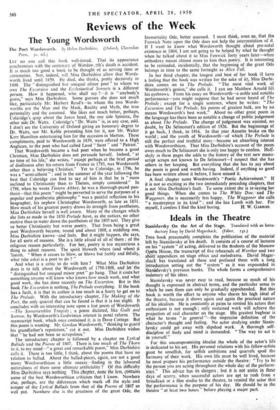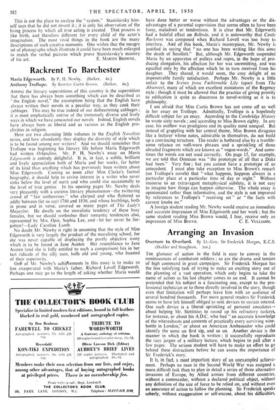Ideals in the Theatre
THIS book presumably completes the publication of the material left by Stanislaysky at his death. It consists of a course of lectures on his " system " of acting, delivered to the students of the Moscow Opera House,'the transcript of five rehearsals of Werther and two shirty appendices on stage ethics and melodrama. David Mager- shack has translated all these and prefaced them with a long introduction setting out the " system " as it was expounded in Stanialaysky's previous books. The whole forms a comprehensive ..sAiMmary of his ideas.
- Stanislaysky was never easy to read, because so much of his thought is expressed in abstract terms, and the particular sense in :which he uses them can only be gradually apprehended. But this .book is worth the effort to anyone who shares his high ideal of the theatre, because it shows again and again the practical nature of his idealism. He is constantly at pains to remind his actors that enthusiasm is not enough ; oply sustained work will achieve the projection of real character on the stage. His greatest bugbear is what he terms " in general "—the imprecise definition of the character's thought and feeling. No actor studying under Stanis- laysky- could get away with slipshod work. A thorough self- discipline of body and mind is demanded. " The way to act is .in yourself."
For this uncompromising idealist , the whole of the actor's life is dedicated to his art. His personal relations with his fellow-artists ,ipust be unselfish, for selfish ambitions and quarrels spoil the harmony of their work. His own life must be well lived, because .he must prepare his performance outside the theatre: " Try to be .the person you are acting throughout the whole day of the perform- ance." This advice has its dangers ; but it is not amiss in these ;days of scurry, when successful actors are apt to rush from a _broadcast or a film studio to the theatre, to remind the actor that the performance is the purpose of his day. He should be in the theatre " at least two hours " before playing a major part.
This is not the place to analyse the " system." Stanislaysky him- self says that he did not invent it ; it is only his observation of the living process by which all true acting is created. That process is like birth, and therefore different for every child of the actor's imagination. The most vivid things. in the book are the many descriptions of such creative moments. One wishes that the meagre set of photographs which illustrate it could have been much enlarged to match the verbal pictures which prove Stanislaysky's mastery











































 Previous page
Previous page